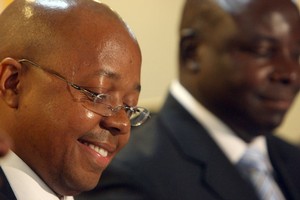By Andrew Warshaw
February 28 – I’ll see you in court if necessary. That is the defiant message issued to FIFA by former South African Football Association (SAFA) CEO Leslie Sedibe (pictured) who has served world football’s governing body with a claim for $5 million for defamation of character after being banned for five years over the 2010 matchfixing scandal along with three other SAFA officials.
According to local reports, the correspondence was personally handed to FIFA president Gianni Infantino when he was in South Africa last week. Sedibe’s lawyer, David Swartz, was reported as saying a court sheriff was dispatched to deliver it.
The alleged offences relate to warm-up matches South Africa played against Thailand, Bulgaria, Colombia and Guatemala in May 2010 ahead of the World Cup. Convicted Singapore-based match-fixer Wilson Perumal’s company had provided the match officials for the four games and flew in officials from Kenya, Niger and Togo.
South Africa were awarded two disputed penalties in a 2-1 victory over Colombia in Johannesburg on May 27, 2010. One was ordered to be retaken twice after the initial efforts were saved. Colombia’s goal also came from a penalty. Four days later South Africa were awarded another two spot kicks in a 5-0 win over Guatemala in Polokwane.
Last December, former SAFA president Kirsten Nematandani was also banned for five years by FIFA’s ethics committee in connection with the scandal but Sedibe, who received his sanction almost a year ago, says he is innocent of any wrongdoing and that “justice will be restored”.
Sedibe and his legal team have given FIFA 14 days to respond, failing which, they have pledged to go ahead with trying to clear his name.
Swartz said they were demanding FIFA “to publicly and officially withdraw the report on Bafana Bafana match-fixing; withdraw the sanctions imposed on Sedibe; and release a media statement on the retraction of the report – at FIFA’s expense – in the New York Times, the Guardian and two national South African newspapers.”
Sedibe’s move is unconventional given that the usual procedure when challenging ethics committee decisions is to go FIFA’s appeals committee and then, if necessary, the Court of Arbitration for Sport.
In the letter, Sedibe’s lawyers argue that the case has “damaged our client’s good name and reputation, which, prior to the report, was of the highest standard as our client has always conducted himself in a most ethical manner in all his business ventures and positions he held.
“It is impossible for our client to pursue various business ventures as now any entity or person, in light of the vast negative coverage in respect to the sanctions imposed on him (wrongfully) by FIFA, refuse to deal with him.”
They added that the report “was premised on various unsubstantiated and baseless allegations which had been levelled against our client”.
“It is common cause that the finding by FIFA in the report was predicated on untruthful and defamatory information presented by representatives of SAFA.
“Furthermore, it is common cause that our client was not afforded an opportunity to present his case to FIFA prior to the release of the report, and that the veracity of the allegations put forward by the representatives of SAFA were never properly investigated and tested by FIFA.”
Contact the writer of this story at moc.l1745208079labto1745208079ofdlr1745208079owedi1745208079sni@w1745208079ahsra1745208079w.wer1745208079dna1745208079

